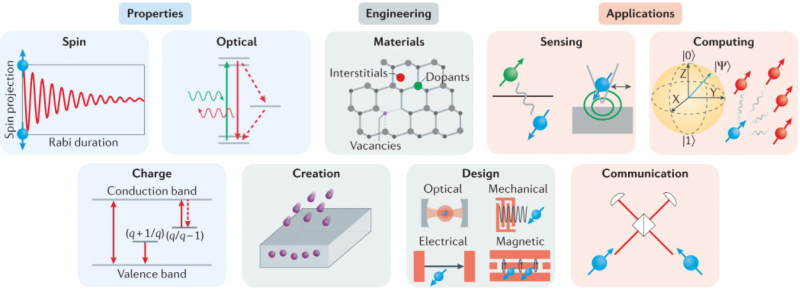Doctoral school:
Fizikai Tudományok Doktori Iskola
Year/Semester:
2022/2023/2
Academic degree:
PhD
Description:
Optically and magnetically active point defect centers in semiconductors may realize as quantum bit candidates for quantum computing. One of the exemplary and most studied centers is the nitrogen vacancy (NV) center in diamond. This system exhibits triplet spin that can be coherently manipulated and the qubit can be read out even at room temperature by optical means. Over the years a plethora of non-characterized defect centers were created in man made diamonds (for example, elementsix of de Beers group) among those there might be ones that possess even better properties than that of NV for quantum technologies. However, the many properties of these defect centers, optical centers, electron paramagnetic resonance (EPR) centers were left unknown in experimental measurements.
Therefore, the PhD student would unravel the physical nature of these defect centers embedded in diamond and other semiconductors (silicon, silicon-carbide, 2 dimensional boron-nitride, etc.) by means of density functional theory (DFT) calculations on the relectronic structure within and beyond the Born-Oppenheimer approximation. The research will be devoted to the characterization of defect centers by providing insight into their electronic structure and thus predict their optically excited states and quantify their radiative and non-radiative relaxation processes. Additionally, other interactions may also govern the physical processes of defect centers: spin-orbit coupling, hyperfine coupling, spin-spin interaction, electron-phonon and spin-phonon coupling, Jahn-Teller instability – all of them may be a key element for actual qubit realizations yet not all of them can be simply measured by experimental means.
Therefore, the results may contribute for realization of qubits in solids or greatly improve the already known defect centers by optimization. These studies will be carried out in close collaboration with domestic and international partners (Princeton University or University of Wisconsin-Madison for example). The ab-initio calculations will be run on the computer cluster. The research group that research group is simultaneously split between BME “FA” building and Wigner RCP.

Illustration of key concepts in the field, highlighting the three major defect properties (spin, optical and charge) in the blue panels, engineering considerations (materials, creation and design) in the grey panels and the three major quantum applications (sensing, communication and computing) in the red panels. Ref. Wolfowicz, G., Heremans, F.J., Anderson, C.P. et al. Quantum guidelines for solid-state spin defects. Nat Rev Mater 6, 906–925 (2021). https://doi.org/10.1038/s41578-021-00306-y
Requirements:
- Keen interest for physics. Curiosity for theoretical derivations on a piece sheet of paper and their realization by means of model simulations on massively parallell computers.
- Excellent knowledge of quantum mechanics. Preferentially, solid knowledge of solid state physics, condensed matter physics or quantum chemistry. (for example: hydrogen atom with n, l, ml quantum numbers, origin of spin-orbit coupling, Periodic table, Fermi's golden rule, Many-body formalism with ladder operators, group theory, GW, BSE, Hartree-Fock equations etc.)
- Optional: Linux shell or terminals. Basic/advanced programmig or scripting skills. There is a possibility but not required that the subject of the PhD may additionally lead to development of ab-initio codes (VASP, Quantum Espresso, etc.) that are written in high level Fortran, C, C++, python.
Requirements:
.
Status:
Finalized/Végleges

